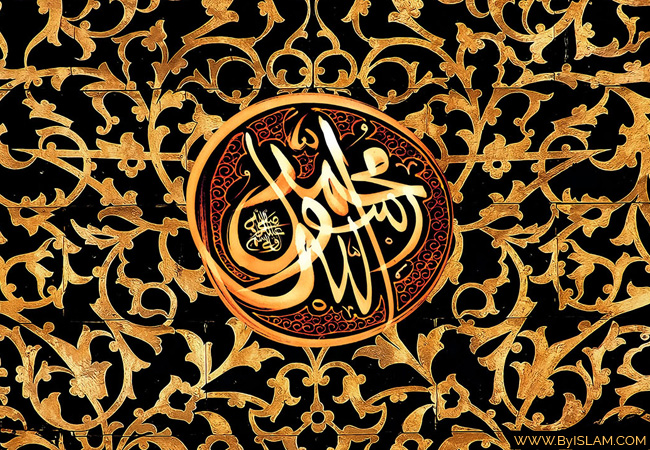
In the city of Medina, twenty five scholars and representatives of Christianity, Judaism, Atheism, Dualism and Polytheism [five from each religion] came to see Prophet Muhammad (S) and challenged him for debate… One by one they proclaimed their faith to Prophet Muhammad (S)…
The Jews described their belief as: “We believe that Prophet Uzair [Ezra] (as) is a son of God and we have come to you O’ Muhammad to see what you say about it. If you accept our belief then surely our religion is better than yours. And if you disagree, then we will have debate and discussion with you…”
The Christian Scholars made claim for the support of their belief as: ‘We believe that God united with Messiah [Prophet Isa (as), Jesus] and so Messiah is the son of God and we have come to you O’ Muhammad to see what you say about it. If you accept our belief then surely our religion is better than yours. And if you disagree, then we will have debate and discussion with you…’
The Atheists had made claim for the support of their belief as: ‘We say that there is no time limit of this Universe, it is qadeem1 (eternally pre-existent) and will remain eternal. We have come to you to see what you say about our belief. If you accept our belief then surely our religion is better than yours. And if you disagree, then in that case we will have debate and discussion with you …’
Dualists said: ‘Our belief is that Light and Darkness are the organizers of this Universe. We have come to you to see what you say about it. If you accept our belief then surely our religion is better than yours. And if you disagree then in that case we will have debate and discussion with you …’
The polytheists of Arab made claim for the support of their belief as: ‘Our belief is that our idols are our Gods. We have come to you to see what you say about our belief. If you accept our belief then surely our religion is better than yours. And if you disagree, then in that case we will have debate and discussion with you.’
When Prophet Muhammad (S) heard the beliefs of all the five groups, he said: “I believe in one God Who is without any partner and I reject any other god. God has sent me as a Warner and Bearer of glad tidings for all human beings. And I am His final proof over all Universes.”
Part 1: Debate with Jews
Then, the Prophet (S) turned towards the Jews and said: “Oh Jews! Have you come to me so that I would accept your claim without any proofs?”
The Jews replied: ‘No.’
The Prophet (S) said: “Then what is the reason behind your claim that Prophet Uzair [Ezra] (S) is the son of God?”
The Jews replied: ‘We say this because Uzair [Ezra] (as) vivified Torah for Jews [Bani Israel, the nation of Prophet Musa (as)] after its destruction and he was able to do this because he was the son of God.’
The Prophet (S) replied: “Now tell me why you consider Ezra [Prophet Uzair (as)] as the son of God, why not Moses (as) [Prophet Musa (as)] who brought Torah for Jews [Bani Israel] and displayed many miracles, which you are aware of. And if the only reason for you to consider Uzair (as) as the son of God is his miracles of vivifying Torah then Musa (as) is more worthy of being called the son of God. And if this minor miracle [vivifying of Torah] can make Uzair (as) the son of God, then the one who possesses much greater miracles should have a higher status than prophethood because if by being a son you mean that man and woman copulate and give birth to a son, then you are infidels because you have compared God to His creatures and attributed to Him the characteristics of a haadith2 (that which comes into existence) and you do believe that what is haadith is a creature and a creature needs a Creator for its creation.”
The Jews said: ‘Yes, we do not think of Uzair (as) as the son of God in this meaning because that would mean infidelity, just like you mentioned. But we call him the son of God to show respect towards him in the same way as some of our scholars call a person ‘my son’ to respect him and appreciate his high status and that person is not related to the scholar by blood because quite often, a stranger who does not have any blood relationship is also called a son. Similarly, when God did what He did to Uzair (as), He made Uzair (as) His son for his respect and not by birth.’
The Prophet (S) said: “What you just said goes against you because if Uzair (as) is the son of God because of this reason then Musa (as) deserves a greater status near God. Undoubtedly, God humiliates those who deny Him instead of accepting Him and returns their argument over them. What you just said about Uzair (as) being the son of God goes against you because just now, you said that a high-ranking person can call a stranger with whom he has no blood relationship his son and it is clear that he did not give birth to this person. So, you may also have seen people with high status calling a stranger their brother, or leader, or father, or master and all of these phrases are said out of respect and honour.
So, the more respect a person has for another, he may call him with a higher title of praise and respect. Now that this is proven and clear to you, it will be alright for you to call Musa (as) the brother of God, or His leader or father or master because it is proven that Musa (as) has a greater status than Uzair (as). So, if God made Uzair (as) His son out of honour, then Musa (as) who possesses a higher status should be given a higher position, like His leader or uncle or lord. So will it be correct in your opinion if Musa (as) is called as the brother of God or His leader or uncle or boss or master?”
Upon hearing this question from Prophet Muhammad (S), all the Jewish scholars were baffled and worried and said: ‘Oh Muhammad, give us time to think over what you said.’
The Prophet (S) replied: “Yes, do think it over but think with an unbiased heart. May Allah show you the right path.”


